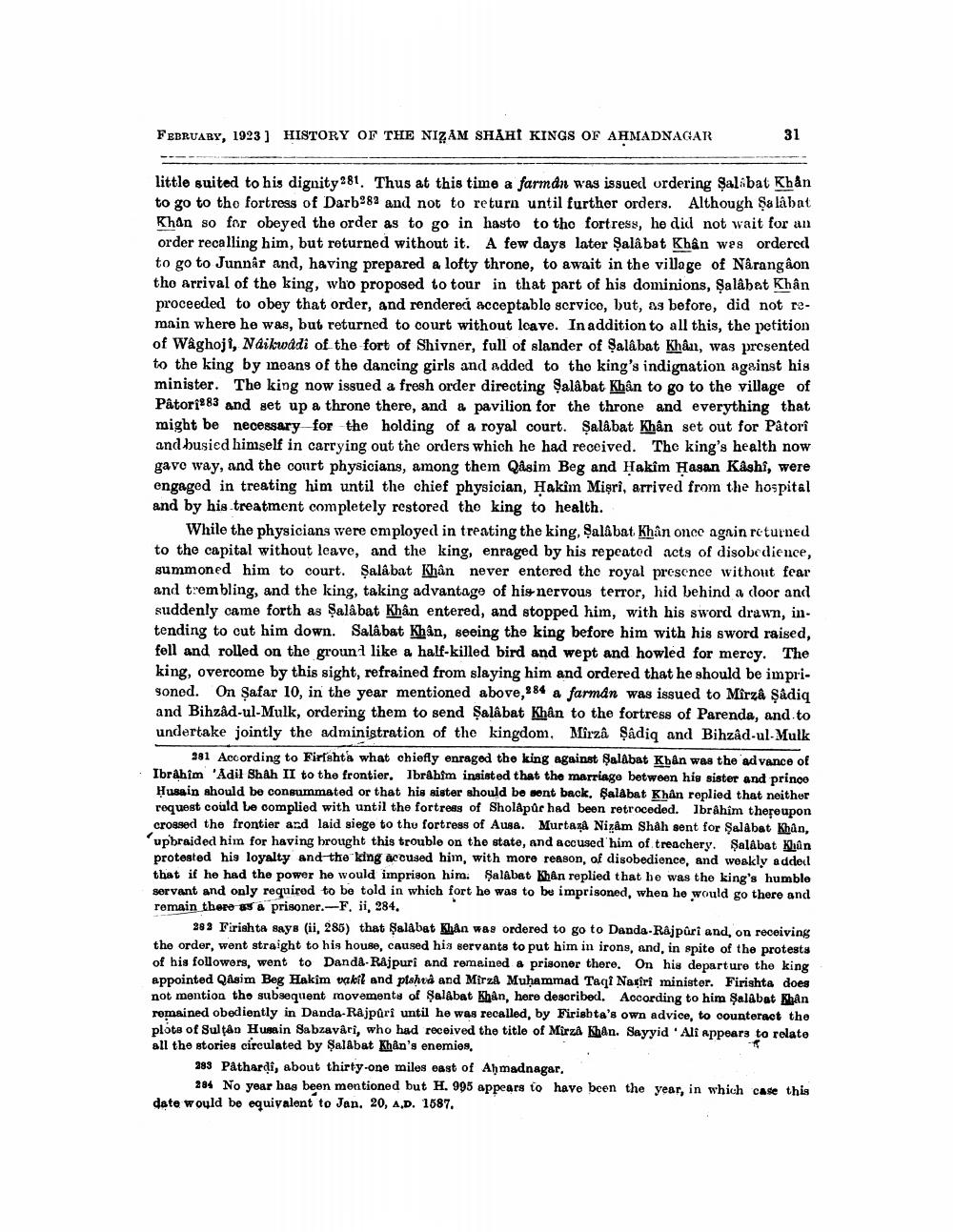________________
FEBRUARY, 1923] HISTORY OF THE NIZAM SHAHI KINGS OF AHMADNAGAR
31
little suited to his dignity 281. Thus at this time a farman was issued ordering Salabat Khân to go to the fortress of Darb282 and not to return until further orders. Although Salabat Khan so for obeyed the order as to go in haste to the fortress, he did not wait for an order recalling him, but returned without it. A few days later Şalâbat Khân was ordered to go to Junnar and, having prepared a lofty throne, to await in the village of Nârangaon the arrival of the king, who proposed to tour in that part of his dominions, Salâbat Khân proceeded to obey that order, and rendered acceptable service, but, as before, did not remain where he was, but returned to court without leave. In addition to all this, the petition of Waghoji, Naikwadi of the fort of Shivner, full of slander of Salâbat Khân, was presented to the king by means of the dancing girls and added to the king's indignation against his minister. The king now issued a fresh order directing Salâbat Khân to go to the village of Pâtori283 and set up a throne there, and a pavilion for the throne and everything that might be necessary for the holding of a royal court. Salâbat Khân set out for Pâtorî and busied himself in carrying out the orders which he had received. The king's health now gave way, and the court physicians, among them Qasim Beg and Hakim Ḥasan Kâshî, were engaged in treating him until the chief physician, Hakim Mişrî, arrived from the hospital and by his treatment completely restored the king to health.
While the physicians were employed in treating the king, Salabat Khân once again returned to the capital without leave, and the king, enraged by his repeated acts of disobedience, summoned him to court. Salâbat Khân never entered the royal presence without fear and trembling, and the king, taking advantage of his nervous terror, hid behind a door and suddenly came forth as Salâbat Khân entered, and stopped him, with his sword drawn, intending to cut him down. Salâbat Khân, seeing the king before him with his sword raised, fell and rolled on the ground like a half-killed bird and wept and howled for mercy. The king, overcome by this sight, refrained from slaying him and ordered that he should be imprisoned. On Şafar 10, in the year mentioned above,284 a farman was issued to Mîrza Sadiq and Bihzâd-ul-Mulk, ordering them to send Salâbat Khân to the fortress of Parenda, and to undertake jointly the administration of the kingdom. Mirza Sâdiq and Bihzâd-ul-Mulk
281 According to Firishta what chiefly enraged the king against Salabat Khan was the advance of Ibrahim 'Adil Shah II to the frontier. Ibrâhîm insisted that the marriage between his sister and princo Husain should be consummated or that his sister should be sent back. Salabat Khân replied that neither request could be complied with until the fortress of Sholapûr had been retroceded. Ibrâhîm thereupon crossed the frontier and laid siege to the fortress of Ausa. Murtaza Nizam Shah sent for Salabat Khân, "upbraided him for having brought this trouble on the state, and accused him of treachery. Salabat Khân protested his loyalty and the king accused him, with more reason, of disobedience, and weakly added that if he had the power he would imprison him. Salabat Khân replied that he was the king's humble servant and only required to be told in which fort he was to be imprisoned, when he would go there and remain there as a prisoner.-F. ii, 284.
282 Firishta says (ii, 285) that Salabat Khan was ordered to go to Danda-Rajpûrî and, on receiving the order, went straight to his house, caused his servants to put him in irons, and, in spite of the protests of his followers, went to Danda-Rajpuri and remained a prisoner there. On his departure the king appointed Qasim Beg Hakim vakil and plshed and Mirza Muḥammad Taqi Nasiri minister. Firishta does not mention the subsequent movements of Salabat Khân, here described. According to him Şalabat Khân remained obediently in Danda-Rajpûrî until he was recalled, by Firishta's own advice, to counteract the plots of Sultan Husain Sabzavari, who had received the title of Mirza Khan. Sayyid Ali appears to relate all the stories círculated by Salabat Khan's enemies,
•
-"
293 Pathardi, about thirty-one miles east of Ahmadnagar,
284 No year has been mentioned but H. 995 appears to have been the year, in which case this date would be equivalent to Jan. 20, A.D. 1587.




